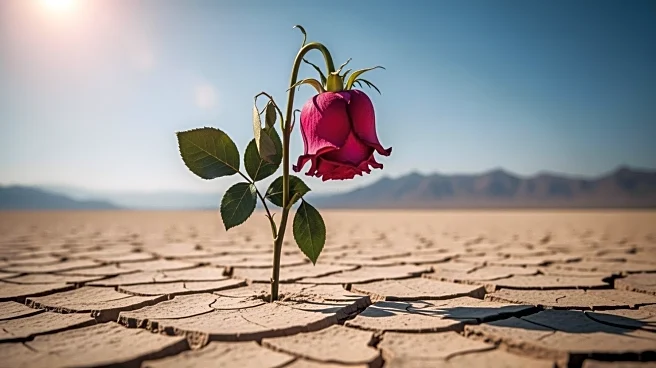What's Happening?
Iran is currently experiencing a prolonged state of crisis as it grapples with reimposed United Nations sanctions and a deteriorating economy. Despite these challenges, the Iranian government has not taken
significant steps to address the situation, such as restarting nuclear negotiations with Western countries or preparing for potential conflicts with Israel and the United States. Supreme Leader Ayatollah Ali Khamenei has previously advocated for 'strategic patience,' but this approach is now being criticized as ineffective. The Iranian rial has plummeted to historic lows against the U.S. dollar, exacerbating public anxiety and economic instability. The sanctions, which were reinstated through a mechanism known as 'snapback,' primarily target Iran's Central Bank and oil exports, crucial sources of revenue for the country.
Why It's Important?
The ongoing crisis in Iran has significant implications for international relations and regional stability. The sanctions, particularly those affecting oil exports, could lead to increased tensions in the global oil market and potential confrontations at sea. The economic strain on Iran may also lead to internal unrest, as public dissatisfaction grows due to inflation and currency devaluation. Furthermore, the lack of progress in nuclear negotiations raises concerns about Iran's potential pursuit of nuclear capabilities, which could destabilize the Middle East and provoke international responses. The situation also highlights the challenges faced by the Iranian government in balancing domestic pressures with international diplomacy.
What's Next?
Iran's path forward remains uncertain, with potential developments including renewed diplomatic efforts or increased military tensions. The international community, particularly the United States and European nations, may continue to exert pressure on Iran to comply with nuclear agreements. Meanwhile, internal political dynamics in Iran could shift as criticism of the government's handling of the crisis grows. The possibility of further economic deterioration may prompt the Iranian government to reconsider its current strategies and seek new avenues for negotiation or economic relief.
Beyond the Headlines
The crisis in Iran underscores the complex interplay between domestic governance and international diplomacy. The Iranian government's reluctance to engage in direct negotiations with Western powers reflects deep-seated mistrust and ideological differences. Additionally, the economic challenges faced by Iran highlight the broader impact of international sanctions on national economies and the potential for such measures to influence political stability. The situation also raises ethical questions about the use of sanctions as a tool for achieving foreign policy objectives, particularly when they disproportionately affect civilian populations.











